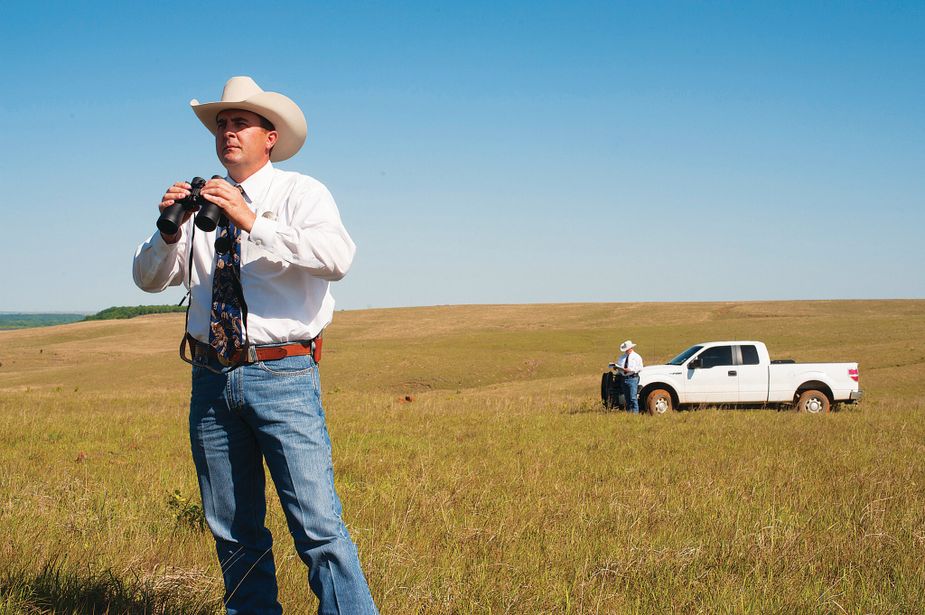In Oklahoma, catching cattle rustlers has gone twenty-first century
Published June 2019
By Katrina Hine | 6 min read
One regional organization is fighting crime to help save ranchers’ livelihoods.

Bart Perrier, who lives near Barnsdall, and John Cummings, a Claremore resident, survey an area near Bartlesville. Photo by Tom Luker
Good guys still wear white hats—at least, the rangers of the Texas and Southwestern Cattle Raisers Association do. Since 1877, they have put fear into the heart of cattle thieves by investigating, tracking, and filing charges against them, offering justice to small family farmers.
“The average Oklahoma cattle producer owns fifty head or less,” says special ranger Bart Perrier. “These aren’t million-dollar operations; most have a full-time job in addition to managing their property and cattle.”
A rancher’s debt often exceeds his or her small profit margin, so when someone steals just a few head, it can be devastating.
Depending on the market, a 500-pound calf can bring $700 at the sale barn. Unlike other stolen property, livestock can be sold for its full value. But theft certainly is not a new problem. During the heyday of the big trails, as herds moved north from Texas through Indian Territory and to railheads in Kansas, rustlers took what they could. To combat this, forty ranchers met in Graham, Texas, in 1877 and decided to hire their own brand inspectors.
In 1946, Oklahoma passed a statute commissioning these special rangers through the Oklahoma State Bureau of Investigation. Today, the TSCRA remains one of the leading livestock associations in the country and among the largest registered brand databases. There are more than 1,100 members in Oklahoma, ranging from big-scale operators to farmers with a few head. The organization covers all types of agriculture crimes with funding largely provided by membership dues. The special rangers cover approximately twenty-one counties and average sixty to eighty cases a year each.
“We are fighting the same crimes that the special rangers that came before us were fighting, except modern technology helps us to identify them quicker,” Perrier says. “Back then, the rangers received a letter in the mail asking for help, and they rode horses for days to get to a location. Now, we use cell phones and trucks.”
The special rangers also use computers, tablets, DNA, and a handful of databases, but modern advances have benefited thieves as well.
“The advent of an interstate highway system and the gooseneck trailer has a lot to do with how cattle thieves operate,” says Larry Gray, executive director of law enforcement and theft prevention services. “They can haul more stolen cattle and take them farther to markets than in the old days.”
Perrier estimates that 80 percent of cattle theft cases can be tied to a drug addiction of some kind. But one case left the rangers scratching their heads. In May 2015, Perrier got a call from a TSCRA member who suspected he was missing some cattle and possibly knew who had taken them. That tip led to six other victims in the Henryetta area—a total of nearly $70,000 in missing cattle.
Perrier began contacting sale barns near the thefts and found one common denominator: a local high school senior. Since the proceeds of sales are issued as checks, this individual’s name was written all over the crime. Through old-school detective work, Perrier was able to track down the thief—who, along with his group of high school accomplices, was looking for easy money, in part to help pay rodeo fees—and charge him with eight counts of larceny.
“The key to our job is to investigate thoroughly and spend the time doing it right,” says Perrier.
Restoring justice, honor, and goodness to the prairie is one of the most rewarding aspects of working for the TSCRA.
“The organization stands for what I stand for and what I want my children to stand for: hard work, taking care of the land, helping neighbors, being responsible, feeding your family and our country,” says John Cummings, Oklahoma regional supervisor. “The ethos of the organization is, ‘A person’s word is his bond.’ We try to live up to the reputation of the rangers that came before us a hundred years ago. We still tip our hats and open doors.”
To learn more about the TSCRA, call (800) 242-7820 or go to tscra.org.







